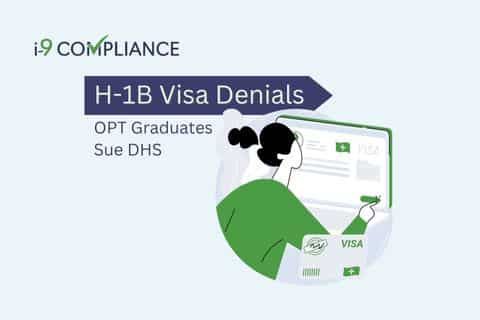OPT Graduates Sue DHS Over H-1B Visa Denials

August 17, 2023
A surge of legal action has emerged over the H-1B visa program. Nearly 70 visa applicants from India have sued the U.S. while trying to immigrate to the United States. These lawsuits address denied applications due to the illegal actions of their employers.
The affected visa applicants participated in an Optional Practical Training (OPT) program. According to the suits, they worked with one of the four I.T. staffing companies accused of fraud. The applicants claimed to have no involvement in the fraud. As such, their association should not disqualify them from the OPT program.
The OPT program allows international students to work in the U.S. after graduation. Most F-1 visa graduates may work up to one year; qualifying F-1 visa STEM graduates may work up to three years. This program enables them to start careers, which many leverage into getting an H-1B or other visas.
The four companies involved in the suit were approved to participate in the OPT program. In addition, they complied with E-Verify, a government-run system that verified workers’ employment eligibility. However, the Department of Homeland Security (DHS) found that these companies defrauded U.S.-involved universities and students.
One of these employers claimed to offer work with major companies for graduates. However, the company also requested hundreds of workers to pay for further training before they could unlock these opportunities. Unfortunately, these workers could not apply for H-1B visas or go to other companies under their F-1 visas. Their applications flagged for involvement in fraudulent OTP employment.
In this case, the plaintiffs learned they had to leave the country and apply for another visa at their local U.S. consular office. However, consular offices typically inform candidates that the DHS made a finding of inadmissibility. Visa applicants must direct any disagreements to the DHS despite having no forum to do so.
The plaintiffs argued that the scheme victimized them as much as the government. However, the DHS unfairly assumed guilt by association. This assumption led to the Department denying their H-1B applications due to the companies’ fraud. They maintain having neither knowledge nor involvement in the four companies’ fraudulent actions.
They also requested that the alleged fraud prove more than the applicant misrepresenting themselves. For example, it should show that they knew they falsified the information that led to the DHS’s final decision.
The plaintiffs hold that the court should set aside the DHS’s findings. They feel the court should order the DHS to allow them to respond to the fraud allegations before re-establishing any findings of inadmissibility on their applications. Furthermore, they argued that the Immigration and Nationality Act requires the DHS to inform applicants of any visa sanctions against them and allow them to respond with evidence.
Legal challenges like these can quickly lead to complex changes and new interpretations of regulations. An example of these ever-shifting regulations is the employment eligibility verification (Form I-9) process, which receives frequent updates to its forms. One way to remain compliant is to invest in an electronic I-9 management system. This system can provide step-by-step guidance throughout the process. It also offers features like electronic storage and helpful reminders to keep employers compliant.
When it comes to your employees, automation makes eligibility verification quick and simple. Ensure compliance today with I-9 Compliance.